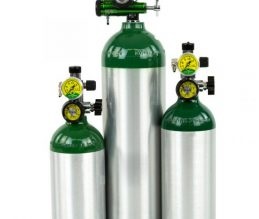
Medical oxygen management: Ghana Health Service trains administrators
In the October 26, 2021 edition of the Daily Graphic, I asserted that Health Service Administrators (HSAs) are unique, and they play managerial roles that are pivotal to supporting clinical care at various echelons of the health system.
I added that the uniqueness of the HSAs emanates from the fact that they provide result-oriented solutions to problems, and they are the only cadre of support staff who go through mandatory on-the-job (housemanship) training before they qualify to be offered permanent appointments.
Consequently, I dare say that a continuously trained HSA translates into continuous effective management of the healthcare system. Among numerous other duties, HSAs have oversight responsibility for the supply of medical oxygen to the clinical areas in our hospitals.
Having recognised the role of HSAs in medical oxygen management perhaps, the Director of Health Administration and Support Services of the Ghana Health Service(GHS) Dr Ebo Hammond, decided to build the capacity of HSAs in this area in various public health facilities across the country through training workshops organised in batches at the Eastern Premier Hotel in Koforidua.
As part of the training workshop, the participants visited the Eastern Regional Hospital where workshop lessons were practicalised to make them more effective in managing various aspects of the medical oxygen supply chain system.
Readers would recall that the apex of the COVID-19 pandemic for example, cruelly exposed the vulnerabilities of most national health systems including that of Ghana.
This difficulty emanated from oxygen demand exceeding its supply during COVID-19. Prevention of a recurrence of this difficulty calls for continuous capacity building for healthcare managers such as administrators to effectively manage this essential healthcare commodity.
Mindful of its critical and lifesaving nature, oxygen’s non-availability can cause preventable deaths.
Oxygen therapy, also known as supplemental oxygen, is the use of oxygen for medical treatment. Accordingly, the World Health Organisation (WHO) classifies medical oxygen as an essential medicine because it is essential to curative and emergency healthcare delivery.
There is no alternative to oxygen in healthcare delivery. Globally, clinicians use oxygen to treat various conditions such as COVID-19, hypoxemia (low oxygen in the blood), carbon monoxide toxicity, pneumonia, etc., as well as for surgery and trauma care.
In surgical care for example, medical oxygen may be prophylactically given to maintain blood oxygen levels during the induction of anesthesia.
Mostly, vulnerable groups such as the elderly, pregnant women and newborns depend on oxygen during certain treatments.
Apart from the health sector, other industries use oxygen on a regular basis, hence oxygen is available on the market for both industrial and medical use.
However, industrial, and medical use of oxygen are not interchangeable. Said differently, industrial oxygen is not intended for human use.
Apart from oxygen, other gases such as nitrogen, medical air, carbon dioxide, nitrous oxide, and helium are classified as medical gases.
Supply Chain
In the hospital, medical oxygen is used at various clinical care units such as the operating theatre, general wards, emergency wards, delivery rooms, intensive care units (ICUs), outpatient departments, as well as in ambulances.
Apart from being classified as an essential medicine, oxygen is a complex product, and it is produced by using a medical device or industrial plant. Oxygen also requires a whole system to safely reach patients who are the end-users.
As such, the oxygen supply chain system consists of production, storage, regulation and conditioning, distribution, use and patient monitoring.
Oxygen supply chain systems need regular power supplies and maintenance to function adequately. Most public hospitals in Ghana largely buy medical oxygen from private sector vendors for use in patient care.
Challenges
Globally, accessing medical oxygen comes with complexities, posing challenges in the form of availability, quality, affordability, management, supply, human resource capacity and safety. Mindful of the fact that medical oxygen is a compressed gas, it equally poses various kinds of danger to both patients and clinicians if not well managed, especially with safety controls.
It came to light during the GHS training workshop organised for Health Service Administrators on medical oxygen management that the health sector of Ghana encounters a plethora of challenges in managing medical oxygen.
Notable among these challenges are inadequate supply, delays in supply, obsolete infrastructure, poor maintenance culture, managerial and technical staff having low knowledge in oxygen management, low in-house generation capacity of hospitals and erratic supply.
The rest are lack of a national response to oxygen production, deployment and management. Overall, Ghana lacks a robust oxygen management and transportation regulatory regime for oxygen supply.
Still, other challenges within the medical oxygen supply chain are low ownership of oxygen cylinders by hospitals, high oxygen transport cost, inadequate safety mechanisms in place to prevent oxygen handling-related accidents/incidents as well as use of free-standing oxygen cylinders by patients’ bedsides in the wards.
Vision
Having become aware of the challenges enumerated above, the Ghana Health Service’s vision for effective and prudent medical oxygen management is to ensure adequate and timely supply of medical oxygen to patients in need.
In line with this vision, the GHS envisages to reduce deaths occurring due to lack of oxygen, support treatment of childhood pneumonia, build in-house oxygen generating capacity since the GHS currently depends on the private sector largely for oxygen supply.
Advisedly, those administrators who benefited from the training workshop must use the additional knowledge acquired to better manage every aspect of medical oxygen use in our hospitals.
They must also seek technical advice from clinical engineers before procuring oxygen equipment such as plants and concentrators.
The writer is a health service administrator. Email: afetikorto@yahoo.com
